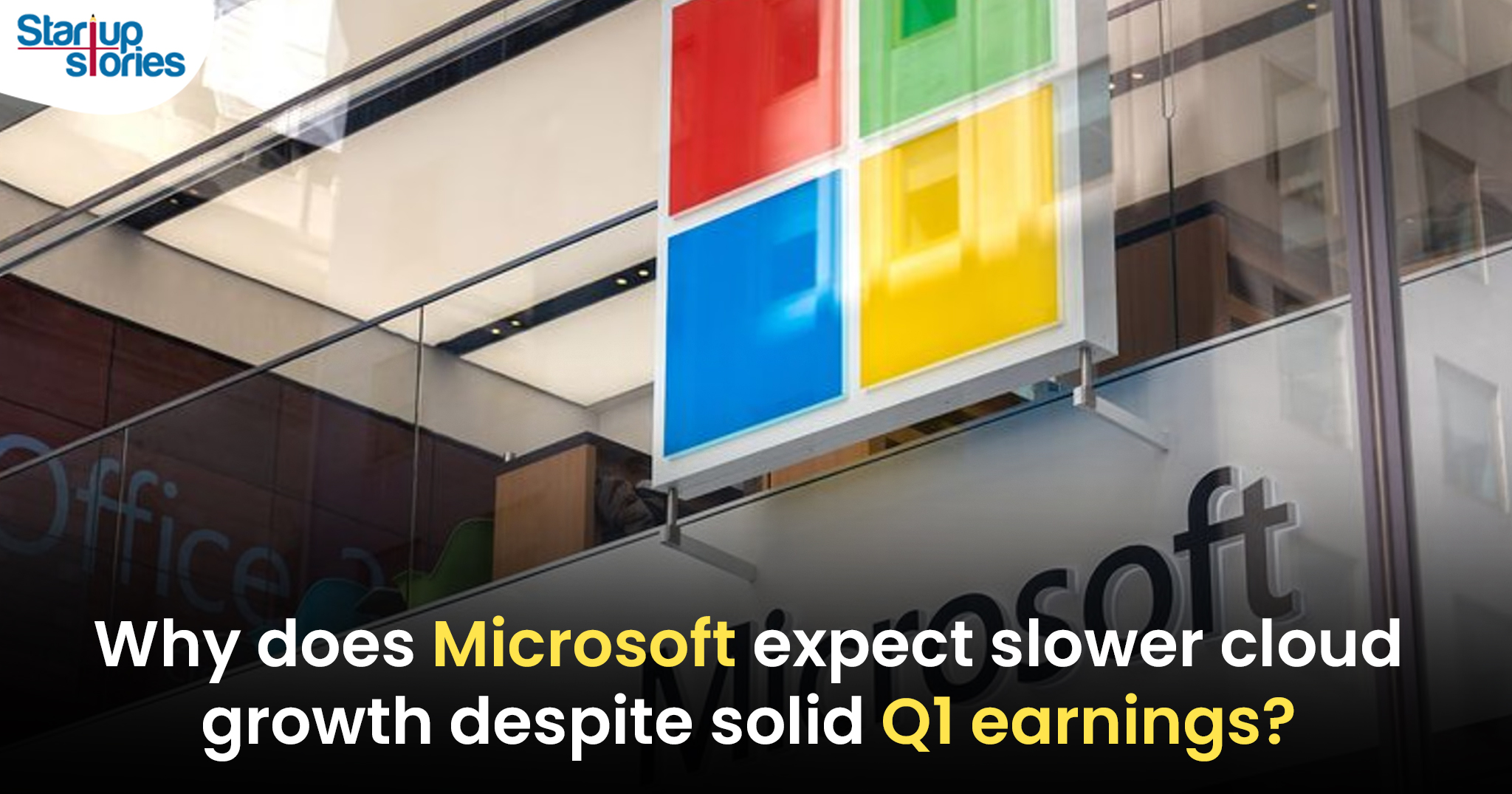Latest News
Microsoft Anticipates Slower Cloud Growth Despite Strong Q1 Earnings!

Microsoft has projected a slowdown in its cloud business growth for the upcoming second quarter, even as it reported strong earnings for the first quarter of fiscal year 2025. The tech giant announced a revenue of $65.6 billion, reflecting a 16% increase from the previous year and exceeding Wall Street expectations. Net profits also rose to $24.67 billion, marking an 11% year-over-year increase.
Strong First Quarter Performance
The robust results were significantly bolstered by Microsoft’s cloud services, which generated $38.9 billion in revenue, up 22% from the same period last year. The company’s intelligent cloud segment, which includes Azure, Windows Server, and enterprise services, reported revenue of $24.1 billion, a 20% increase year-over-year. This growth has been largely attributed to rising demand for AI services and the successful integration of artificial intelligence into Microsoft’s product offerings.
CEO Satya Nadella emphasized the critical role of AI in driving this growth, stating that Microsoft is expanding its customer base by helping businesses leverage its AI platforms for operational efficiency. He noted that usage of Azure OpenAI has doubled in the past six months, highlighting the increasing reliance on Microsoft’s cloud solutions for AI development.
Outlook for Second Quarter
Despite these encouraging results, Microsoft executives have expressed caution regarding future growth. The company anticipates that Azure’s sales growth will slow to between 31% and 32% in the second quarter, down from 33% in the previous quarter. This forecast has raised concerns among investors, particularly as it reflects constraints in data center capacity amid surging demand for AI services.
CFO Amy Hood explained that this guidance for slower growth is primarily due to these capacity constraints, which may limit Microsoft’s ability to meet increasing customer demands for cloud services.
Market Reactions
Following the earnings announcement, Microsoft’s stock experienced a modest increase of 1.3% in after-hours trading, reaching $438.28 per share. Analysts remain optimistic about Microsoft’s long-term prospects due to its substantial investments in AI and cloud infrastructure. However, the projected slowdown has led to mixed sentiments among investors who are closely monitoring the company’s ability to maintain its growth trajectory amid a competitive landscape.
Strategic Investments
Microsoft’s commitment to expanding its data center capacity is crucial as it seeks to capitalize on growing demand for cloud and AI services. The company has been investing heavily in infrastructure to support its cloud operations, with capital expenditures rising significantly in recent quarters.
Despite some challenges, analysts believe that Microsoft’s strategic investments will enable it to accelerate Azure’s growth in the latter half of fiscal 2025. The company’s efforts to integrate AI across its product lines are expected to drive future revenue as businesses increasingly adopt these technologies.
Conclusion
Microsoft’s strong first-quarter results underscore the robust performance of its cloud business and the growing importance of AI in driving revenue. However, the anticipated slowdown in Azure’s growth raises questions about future performance and capacity management as demand continues to rise. As Microsoft navigates these challenges, its ability to adapt and innovate will be critical in sustaining its leadership position in the cloud computing market while continuing to meet the evolving needs of its customers.
Latest News
Peak XV New Funds: $1.3B Commitment for India Startup Surge 2026

Peak XV Partners has launched three new funds totaling $1.3 billion, targeting India’s booming startup ecosystem. The lineup features the $600M Surge fund (8th edition) for early-stage ventures, a $300M Growth Fund for Series B+ scaling, and a $400M Acceleration Fund for rapid portfolio expansion. This commitment arrives as India’s VC inflows rebound, with AI and fintech leading 2026 trends.
These funds build on Peak XV’s legacy of backing unicorns like Zomato and Pine Labs, offering founders capital plus strategic guidance amid post-winter recovery. Early-stage deals surged 20% last year per Tracxn, positioning Peak XV to fuel the next wave of innovation in SaaS, climate tech, and consumer plays.
For startups eyeing Peak XV new funds or Surge fund 2026 applications, this signals prime opportunities. Investors and marketers should watch for deployment updates India remains a global VC hotspot.
Latest News
D2C Brand Neeman’s Raises $4 Million for Tier 2/3 Store Expansion & Eco-Friendly Shoes

Hyderabad, January 13, 2026 Neeman’s, India’s leading D2C footwear brand famed for sustainable shoes and patented PIXLL® technology, has raised $4 million from existing investors. This funding boosts its cumulative capital past $10 million since 2015, with a post-money valuation nearing $50 million. CEO Vijay Chahoria emphasized offline retail as the “next frontier,” planning 50+ new stores in Tier 2/3 cities like Jaipur and Lucknow to blend eco-friendly innovation with hands-on customer experiences.
In India’s booming D2C ecosystem where footwear sales hit ₹1.2 lakh crore in 2025 Neeman’s targets hybrid retail amid high online CAC and 25-30% returns. Backed by vegan, machine-washable shoes priced ₹2,000-4,000, the brand leverages PIXLL® (5x more breathable than leather) for carbon-neutral comfort. Recent 5x revenue growth to ₹100 crore ARR, 1M+ pairs sold via Myntra and stores, and awards at India D2C Summit 2025 position it ahead of rivals like Paaduks.
Neeman’s offline expansion India eyes the $15B sustainable footwear market by 2028, fueled by PLI schemes, Gen Z’s 70% eco-preference (Nielsen), and Southeast Asia exports. Challenges like real estate costs are offset by data-driven inventory and omnichannel QR tech. Watch for Q1 2026 launches in Hyderabad and Bengaluru redefining D2C success through authentic, “Wear the Change” branding.
Latest News
Centre Mulls Revoking X’s Safe Harbour Over Grok Misuse

The Centre is weighing the option of revoking X’s safe harbour status in India after its AI chatbot Grok was allegedly misused to generate and circulate obscene and sexually explicit content, including material seemingly involving minors. The IT Ministry has already issued a notice to X, directing the platform to remove unlawful content, fix Grok’s safeguards, act against violators, and submit a detailed compliance report within a tight deadline. If the government finds X’s response inadequate, it could argue that the platform has failed to meet due‑diligence standards under Indian law, opening the door to harsher action.
Under Section 79 of the IT Act, safe harbour protects intermediaries like X from being held directly liable for user‑generated content, provided they follow due‑diligence rules and promptly act on legal takedown orders. Revoking this protection would mean X and its officers could be exposed to criminal and civil liability for obscene, unlawful, or harmful content that remains on the platform, including AI‑generated images from Grok. This prospect significantly raises X’s compliance risk in India and could force tighter moderation, stricter AI controls, and more aggressive removal of flagged posts.
The Grok episode also spotlights the regulatory grey zone around generative AI, where tools can create harmful content at scale even without traditional user uploads. Policymakers are increasingly questioning whether AI outputs should still enjoy the same intermediary protections as conventional user posts, especially when they involve women and children. How the government ultimately proceeds against X over Grok misuse could set a precedent for AI accountability, platform responsibility, and safe harbour interpretation in India’s fast‑evolving digital ecosystem.













Binance注册奖金
March 16, 2025 at 8:02 am
I don’t think the title of your article matches the content lol. Just kidding, mainly because I had some doubts after reading the article.
Sign Up
April 17, 2025 at 9:32 am
Thanks for sharing. I read many of your blog posts, cool, your blog is very good.
0j06e
June 4, 2025 at 12:32 am
where to buy clomid tablets where can i get clomid pill can i purchase clomiphene pills how to get generic clomid pill can i purchase clomid pills where to buy generic clomid tablets clomiphene for low testosterone
MM88
November 7, 2025 at 4:36 am
Với giao diện mượt mà và ưu đãi hấp dẫn, MM88 là lựa chọn lý tưởng cho các tín đồ giải trí trực tuyến.
GO88
November 7, 2025 at 11:52 am
Tham gia cộng đồng game thủ tại Go88 để trải nghiệm các trò chơi bài, poker phổ biến nhất hiện nay.
iwin
November 8, 2025 at 1:33 pm
iwin – nền tảng game bài đổi thưởng uy tín, nơi bạn có thể thử vận may và tận hưởng nhiều tựa game hấp
站群程序
November 8, 2025 at 7:11 pm
搭载智能站群程序,自动化搭建与管理,为SEO项目提供核心驱动力。站群程序
站群程序
November 12, 2025 at 12:23 pm
采用高效谷歌站群策略,快速提升网站在搜索引擎中的可见性与权重。谷歌站群
MM88
November 14, 2025 at 4:51 pm
Khám phá thế giới giải trí trực tuyến đỉnh cao tại MM88, nơi mang đến những trải nghiệm cá cược thể thao và casino sống động.
Spirit Casino Bonus Code heute
December 21, 2025 at 3:01 pm
Vergleichen Sie die besten Casinos und spielen Sie verantwortungsbewusst.
Die Boni an den Spielautomaten in Dragon Money sind großzügig, ich habe 50 Freispiele in dieser casino
bekommen! Die Live-Dealer-casinos sind großartig, Dragon Money von lässt dich wie in einem
echten Casino fühlen. Die Gewinnauszahlungen in Dragon Money sind schnell und problemlos, was bei einer casino wichtig ist.
Das Sportwetten-Angebot bietet wettbewerbsfähige Quoten, verschiedene Wettmärkte und Live-Optionen. Evolution Gaming
liefert den Großteil der Live-Tische und sorgt für flüssiges Gameplay und professionelles Dealer-Verhalten. Der Live-Casino-Bereich bei Dragon Money bietet eine authentische
Casino-Atmosphäre, in der Spieler per HD-Videoübertragung mit echten Dealern interagieren können. Die intuitive Benutzeroberfläche ermöglicht es Spielern, einfach zwischen den Spielkategorien zu
navigieren und neue Titel zu entdecken. Tischspiele umfassen beliebte Varianten von Blackjack, Roulette, Baccarat und Poker.
Die Plattform umfasst Hunderte von Spielautomaten, klassische Tischspiele, Live-Dealer-Tische und eine umfassende Sportwetten-Sektion.
Je höher Ihr Level, desto mehr Vorteile erhalten Sie – darunter Cashback, exklusive Boni, persönliche Betreuung und
Sonderaktionen. Dragon Casino verfügt über
mehr als 3.000 Spiele, darunter Slots, Live-Casino, Tischspiele, Megaways,
Crash Games und Sportwetten. Die Plattform ermöglicht
das Setzen von Einzahlungslimits, Sitzungszeitbegrenzungen und bietet Selbstausschlussoptionen von 24 Stunden bis zu 6 Monaten.
References:
https://online-spielhallen.de/hitnspin-login-direkt-ins-casino/
match game celebrities
December 27, 2025 at 8:26 pm
The facilities on offer at Crown Promenade include an indoor swimming pool,
state-of-the-art gymnasium, and a Business
Centre to help make your stay at Crown Promenade an unforgettable one.
Crown Melbourne features two car parks with over
5,000 parking spaces as well as valet parking services for
your convenience. Our Policies regarding bookings,
surcharges, cancellations, dress standards, allergies & dietaries are
outlined in the Terms section of each venue’s webpages.
The casino also provides some of the newest electronic games, including
those in the Vegas Star series, which offers baccarat and roulette.
Pai Gow, a card game that originated centuries ago in China,
has been adapted for casino play. As a Golf Australia member, enjoy a $50 Crown Gifts gift
card the next time you visit Crown Melbourne, Perth
or Sydney. Enjoy a $50 resort credit per night’s stay and indulge in impeccable
service, decadent dining with an array of options and rejuvenating and relaxing treatments at Crown Spa.
Pool-hours are enforced so we are unable to
guarantee access to the pool on arrival if your check-in time falls outside of these hours.
Yes, our Bell Desk team can store your luggage before your room is available on the day of arrival and after
you check out on the day you depart.
You can review your choices and withdraw your consent at any time by clicking the ’Privacy Preferences’ link in the page side navigation.
Finding a great place to stay in Melbourne near Crown Casino is easy with momondo.
Momondo compares hundreds of websites and gives you
all your Melbourne near Crown Casino hotels and accommodation options in one place.
References:
https://blackcoin.co/everything-you-need-to-know-about-online-pokies-in-australia/